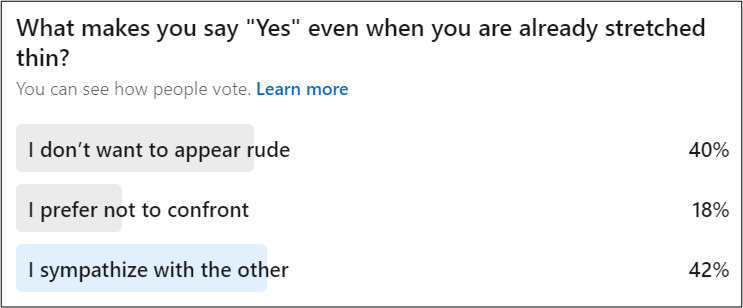Is Toxic Empathy Real?

Leadership & Management
218 week ago — 5 min read
I am a big proponent of Emotional Intelligence and I never thought I would say this, but – yes, there is something called ‘toxic’ empathy!
Recently, I did a poll on LinkedIn asking why people say ‘Yes’ when they mean ‘No’. A large number of people said they take on others’ responsibilities because they sympathise with them. An almost equal number of people said they do not want to appear rude. Apparently avoiding confrontation is a concern for a smaller number of people.

It’s a simple fact that you can never be productive if you take on too many commitments—you simply spread yourself too thin and will not be able to get anything done, at least not well or on time. That’s why the art of saying no can be a game changer for productivity.
If empathy is a positive, useful, and desirable attribute, then you may think there’s nothing wrong with having “too much” of it. But like everything in life, excess is never good, and it’s best to have a healthy balance.
What does Toxic Empathy feel like?
The problem arises when you want to solve everyone’s problems to reinforce the image you want to project, of being valuable and needed. Check if you have experienced any of the following:
- You try to validate yourself by doing favors.
- Pitying others’ situations often and use it as a justification if they are mean and unpleasant towards you.
- If someone tries to set boundaries, you feel hurt and rejected.
- You are emotionally mirroring another individual’s pain and feeling drained.
- You are often overprotective and undermine other people’s autonomy.
- You have serious trouble being productive at work.
- You have a saviour complex - an urge to be there for others, irrespective of your own mental health.
- Last but not least, you often move from excessive empathy to resentment, feeling angry and let down or unappreciated.
Saying No Doesn’t Mean You are a Bad Person
We are wired to want to be liked. We worry that if we say no, we will feel humiliated, guilty, or ashamed, and will end up being alone, rejected, or abandoned. As social beings, we fear upsetting others. We’re scared of missing out. We like to be part of the crowd. We struggle with decision making. It’s easier to say ‘yes’.
Saying no doesn’t mean that you are being rude, selfish, or unkind. These are all unhelpful beliefs that make it hard to say no. As children, we learned that saying no was impolite or inappropriate and yes was the polite and likable thing to say.
We have to realise that we are now adults, we are more mature and capable of making our own choices, as well as knowing the difference between wrong and right. Therefore, ‘no’ shouldn’t be off-limits, but rather something that we decide for ourselves, based on our own discretion.
Is It Really Worth It?
Understand that with the urge to say yes also comes a lack of self-confidence and self-value. You need to break the vicious cycle of the need to over-commit to feel valued and validated and then to feel resentful and tired.
No is a moment of clear choice.
Yes carves little slices from you, while No is a rock and a shield. Therein lies its power.
It is difficult in the beginning, especially for people pleasers, but with practice you will get an increasing strength to say No. Start with saying No when:
- It keeps you true to your principles and values.
- It keeps you focused on your own goals.
- It protects you from abuse by others.
- You need the strength to change course.
Time is our most precious and finite resource. We have the power to control the way we use our time, but few of us exercise this right thoroughly. Next time, think before you say ‘Yes’.
Also read: Breaking the habit loop
To explore business opportunities, link with me by clicking on the 'Connect' button on my eBiz Card.
Image source: shutterstock.com
Disclaimer: The views and opinions expressed in this article are those of the author and do not necessarily reflect the views, official policy, or position of GlobalLinker.
Posted by
Khyati ShahIf you are feeling constrained or unable to overcome a personal or professional barrier, partner with Coach Khyati Shah and pave your way to success. Khyati partners with...
View Khyati 's profile
Other articles written by Khyati Shah
View AllMost read this week
Trending
Ecommerce 16 week ago













Comments
Share this content
Please login or Register to join the discussion